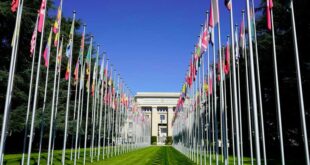Farzad Ramezani Bonesh
Senior Researcher and Analyst of International Affairs
Relations between Iraq and Turkey (with a 370-kilometer common land border) have undergone various changes since World War I. The following article addresses Turkey’s important economic and political goals in relations with Iraq.
Important political and security goals:
The Turks had a strategic view to Iraq during the Ottoman period. With the rise of the AKP in Turkey, the policy of valuing strategic depth and neighbors emerged under the guise of neo-Ottomanism in Turkish foreign policy.
Haidar Ebadi’s presence in power reduced Turkey’s influence in Iraq. Disputes over problems such as the presence of Turkish troops in northern Iraq, the liberation of Mosul and the situation of Kurds and Turkmen, etc. were raised. But in the current situation, despite various challenges, Ankara intends to create a new chapter in relations between the two countries. Meanwhile, Ankara plans to reopen new consulates in various parts of Iraq.
In another dimension, many in Baghdad accuse Ankara of using the water dispute to put pressure on Iraq and gain more concessions. In fact, it is an important part of Iraq’s water problems with Turkey. Therefore, reducing the share of Iraqi water by 30 billion cubic meters per year and Iraq’s dependence on the Tigris and Euphrates waters and negotiations to guarantee the share of Iraqi water can be a good lever to regulate relations with Baghdad.
Moreover, Turkey is trying to lead ideological programs and support the Sunni factions and the Brotherhood. Planning for the future of the political and social structure of northern Iraq is also of particular importance for Turkey.
From Turkey’s point of view, the Turkmen, as the second largest ethnic group in the Kurdistan Region, should play a role in Iraq and the Kurdistan Region. Therefore, Ankara tries to support the Iraqi Turkmen.
At the declaration level, Ankara supports Iraq’s territorial integrity and political unity, but in practice, it sees the PKK’s presence in Iraq as a threat to Turkey’s national security and Iraqi sovereignty.
In this sense, with Baghdad’s inability to control the PKK, Turkey has effectively implemented policies to protect its national security bases and thousands of forces without full agreement with the Iraqi central government in northern Iraq.
In fact, although Baghdad does not accept Turkey’s right to intervene in Iraq and operations against the PKK and considers it as questioning of its ability to violate national sovereignty,
but Turkey is trying to use Baghdad indirectly against the PKK, by the support of the Iraqi army. It also tries to have a long military presence in northern Iraq (such as northern Syria) by increasing of military bases.
As a result, in recent years, Turkish fighter jets have sometimes violated Iraqi airspace to a depth of 193 km, and Turkish ground forces have infiltrated Iraqi territory to a depth of 80 km. In the meantime, Turkey is afraid that PKK forces in Sinjar establish strong ties between Qandil and northern Syria and Turkey. Therefore, beyond the provisions of the 1983 bilateral agreement, it intends to have a greater security and military presence in the northern parts of Iraq.
Important economic and energy goals:
Although, trade volume between Iraq and Turkey decreased after political disputes and the presence of ISIS in Iraq, but Turkey allocated about $5 billion to Iraq at the Kuwait Conference on Iraq Reconstruction (February 2018).
Iraq is one of Turkey’s major export partners, and increasing bilateral trade to $20 billion and beyond in the coming years is crucial for the Turks. Al-Kadhimi’s government also wants texpanding economic cooperation between the two countries. Therefore, expanding its presence, influence and competition with regional competitors such as Iran is an important opportunity.
In addition, Iraq is very important for Turkey in the field of energy diplomacy. Although Turkey’s 50-year deal with the Kurdistan Region in 2013 is not desirable to Baghdad, but Turkey needs Iraq as its source of energy.
In fact, Turkey (with its about 75% dependency on energy) is looking for more cooperation with Iraq. Apart from this, Turkey can pay attention to imports apart from investing in the energy sector. This will increase energy exports, increase foreign exchange earnings and improve the economic situation and ultimately increase the country’s geopolitical position.
In addition, Iraq with its forty million populations and a suitable technical engineering market is a very large market for Turkey. Turkey is trying to secure its economic interests in the Iraqi market by providing an economic presence and opportunities for Turkish companies.
Vision
Turkey’s political and economic behavior and goals in Iraq arise from a set of different factors and variables that are put together based on different priorities and ultimately lead to Ankara’s decision. Maybe Al-Kazemi is seeking to establish balanced relations with Turkey to preserve Iraqi national sovereignty. However, the two main issues of water and security are still important challenges in the development of relations between the two countries, and failure to resolve them in the short and medium term could have a negative impact on the dimensions of cooperation.
 Geostrategic Media Political Commentary, Analysis, Security, Defense
Geostrategic Media Political Commentary, Analysis, Security, Defense





